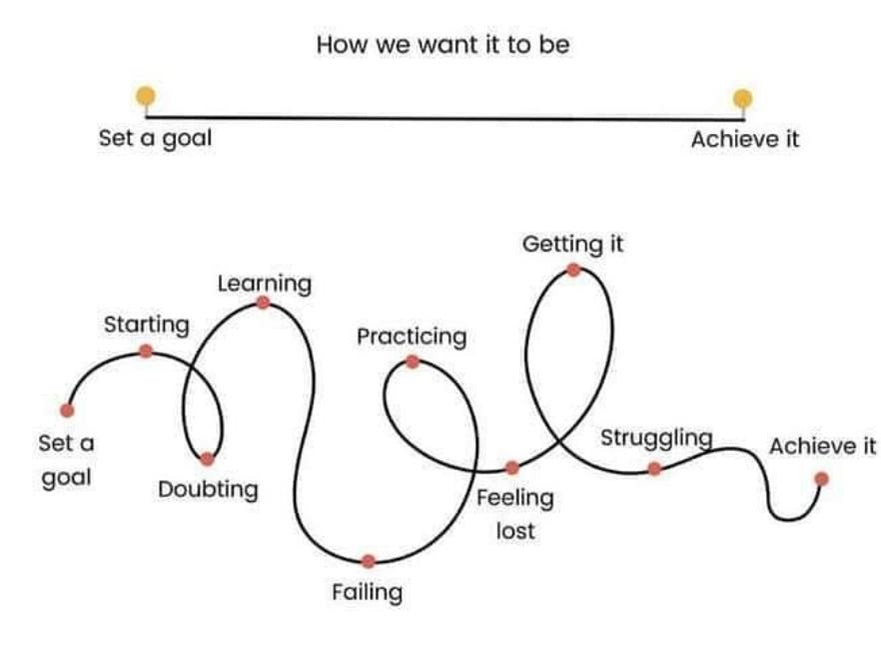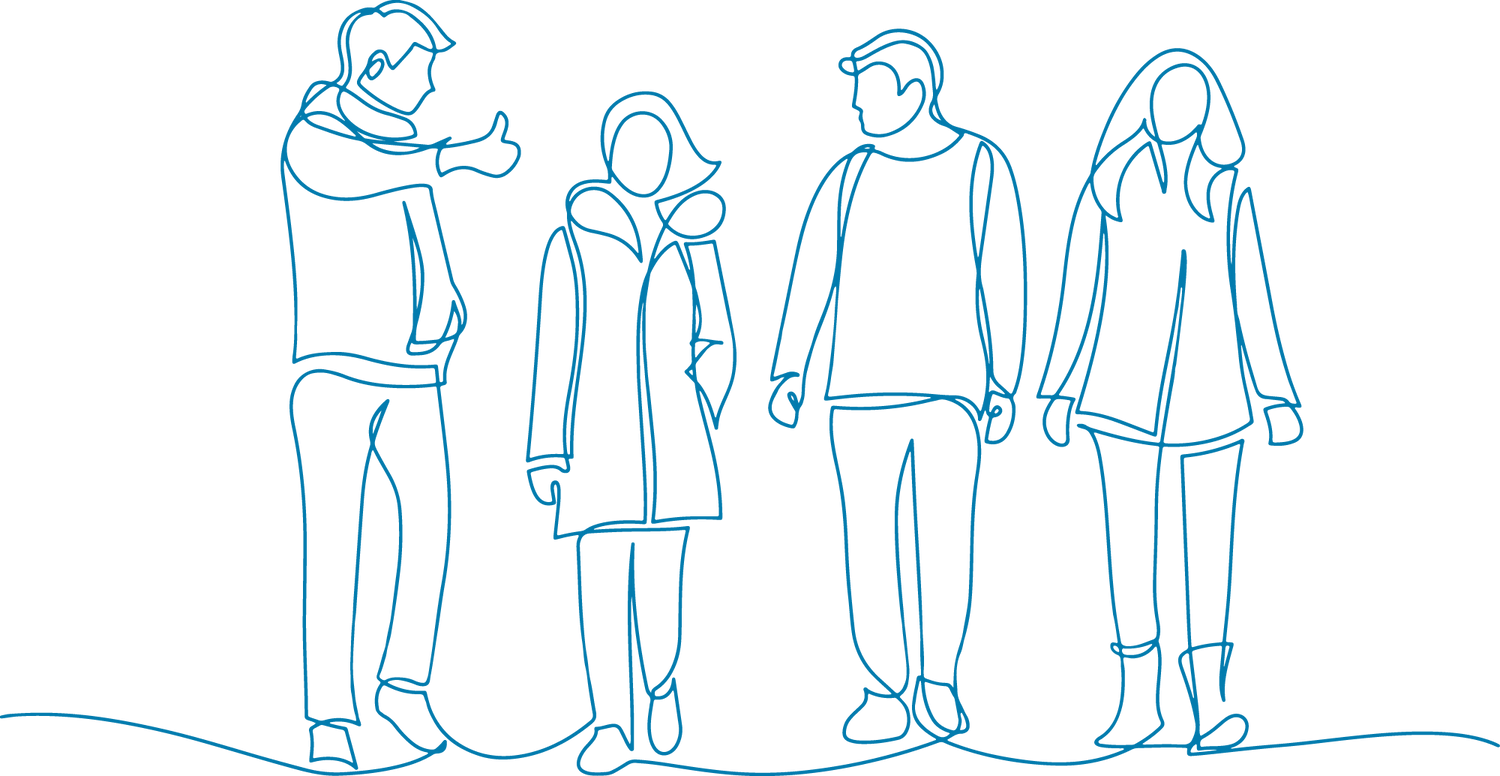Take a look at the image.
Now, think about anything you've achieved in your life so far.
Which of those lines best represents how you got there?
Did you come up with a goal and follow a straight, simple and easy line to get there, or did you follow the squiggly messy path of stress and challenge before you finally made it?
When I think about the successful, easy and happy sober life I'm now living, it's very clear to me that the messy squiggle is exactly how I got here. Even "setting the goal" wasn't a straightforward process. It's not like there was just one day where I woke up and decided I was going to stop drinking and live the rest of my life sober. This was a decision I made over and over and broke over and over.
But, when I did set the goal, I started with enthusiasm. I'd pour all remaining wine down the sink. I'd take all my bottles to the bottle bank. I'd plan how I was going to spend my hangover-free time and what I was going to do with the money I wasn't spending on drink. Starting was easy. I'd feel motivated and determined.
Then, it would get hard. I might have a social event coming up that I just couldn't imagine facing sober. I might feel stressed and exhausted. I might just want to reward myself. I might just have told myself "I can't do this" or "this isn't possible for me" - I might doubt that I could do it. I often felt miles away from other people who were further down the road than me and were waxing lyrical about their amazing sober lives. I often felt like that wasn't possible for me.
That doubt and the limiting beliefs that lay behind it were responsible for many a moment of giving up and reaching back for the bottle again.
I would allow these triggers and challenges, this self-doubt and these limiting beliefs to trip me up. I would fail time and time again, reaching for the bottle when it got difficult.
But it was through failing that I learnt.
I did lots of failing and lots of learning.
Every time I went back to drinking, I learnt something more about why I was doing it, what my triggers were and how to avoid similar triggers in the future. I remember one hot, sticky and grimy weekend after having moved house with my partner, having shifted van-load after van-load of furniture and after having stayed successfully sober for a month or so, rewarding myself in the evening sun outside our new little picture perfect cottage with a couple of lagers, which quickly turned into a couple of bottles of wine, which quickly turned into another few months of bingeing...
Lesson learnt: alcohol, for me, is a REWARD. Find other ways to reward myself and watch out for the reward trigger.
Every failure was a learning opportunity, providing I reflected on it, learnt from it and changed what I did as a result.
I spent years practising. Sometimes, I'd manage a week sober. Sometimes, it would be a couple of months. Once, I even did a couple of years before I found myself sipping daintily on an elegant white wine spritzer at a family gathering. You can guess what that one white wine spritzer led to...
But, practise is good. Eventually, I learnt that practise is essential in order to perfect something. Mistakes are essential in order to become proficient. It's like learning any new skill - it takes dedication, practise and repetition before it becomes automatic and easy. The first time you try and play a scale on a musical instrument, it's awkward, clumsy and sounds horrible. With enough practise, you end up with your fingers flying over the instrument with ease and without you having to think about what you're doing. And, the sound you're producing is beautiful.
It's the same with learning how to live your life sober. You make mistakes, you blunder, you mess up and you learn - and, eventually, it's second nature and you're not having to give it any thought at all.
There were times along the way, especially in the early days, when I ended up feeling lost. In fact, there were so many, I can't count them all. I remember one particularly bad time, in my first year of sobriety, when I was staying in a little casita in the mountains in Southern Spain... I was in the throes of a major anxiety attack and was curled up in bed for days, not knowing how I was going to survive without alcohol to help me through. I was on my own, away from family and friends. Even my nearest neighbour was a whole mountain away and only spoke Spanish! The only company I had was a dog. Lost is a good description!
That was one of the most "lost" feelings I'd ever had in my life and I survived it. I carried on breathing and living and emerged from my little sweaty bedroom at the end of it thinking if I could survive that without alcohol, I could survive anything.
It made me stronger.
The mistakes, the feeling lost, the failing, the practising, and the struggling all built me up to be stronger, more resilient and more secure and confident in my sober lifestyle choice.
There have to be struggles because you're learning something new. If there wasn't any struggle it would signify that you're doing something familiar and easy. To make change you have to go through some struggle in order to move through the change and be a better version of yourself when you come out the other side.
And, of course, there were plenty of times along the way when I was just getting it. When it was falling into place and I understood that I could be myself, I could be funny, I could be sociable, I could have fun and I could have a laugh and I could do all of this without drinking. It was a real revelation to me that this was possible. I also got it that I could find healthier ways to reward myself. Healthier ways to relieve stress and anxiety.
The getting it and the achievement of the goal is only possible when you've gone through all the rest on that squiggly line. To be clear, all of the elements on that line don't have to happen in that order. You can go from getting it one minute to failing the next. From struggling, to doubting and then to starting again. The important point is that achieving a goal, whether it's living your life sober or anything else, is going to entail a combination of mess and squiggle before you get there. Anticipating and expecting this makes it much easier to deal with and more likely that you'll succeed.
Do you have a squiggly line and, if you did, what would it look it?


